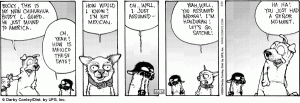I moved back to Los Angeles about six months ago. In the half year that I’ve been back, I’ve been most grateful to see old friends, to discover great places and events that sprung up in my absence, and to skip winter altogether.
But I’m also happy that my return to California has had a positive effect on this blog. In my previous hometown in the Midwest, Hispanics are still a fairly rare sight, so Latino-themed stories don’t pop up too often. But in LA, every other newsmaker has a name that ends in Z, or some debate gets going about clashing cultures, or there’s a new Hispanic-influenced restaurant, art form, or social movement taking hold.
For example, the Catholic Church recently named a new leader of the Los Angeles diocese, which has the largest concentration of Catholics in America. Archbishop Jose Gomez is now “in line to become the highest-ranking Latino in the American Catholic hierarchy and the first Latino cardinal in the U.S.”
His predecessor, Cardinal Roger Mahony, said he was “grateful to God for this gift of a Hispanic archbishop” and said he personally asked the pope to supply him with a Latino replacement. Los Angeles has five million Catholics, over 70 percent of whom are Hispanic, so Gomez’s appointment couldn’t have been too much of a shocker. Even so, Mahony’s sentiments – thanking God for a Latino and pressing to replaced by a Hispanic – are somewhat rare occurrences in the United States, as I’m sure you can imagine. But it happens here in California.
By the way, Gomez was a member of Opus Dei, which according to several conspiracy theorists and best-selling authors, is really just a front for power-hungry zealots, albino assassins, and killer dwarves. If true, it could make the line for communion very interesting.
Another only-in-LA moment came when I saw the poster for an upcoming Cinco de Mayo celebration. But this was not some bland, half-assed get-together with cheap tequila shooters, which you might find in other parts of the country. No, this party (called Cinco de Mayan), features “mucho sexo y violencia in the form of burlesque dancers, masked Mexican wrestlers, comedians, mariachi, Aztec dancers, and more.”

To be honest, I have no plans to attend this event. But just knowing that it exists here makes me smile.
Still, it’s not just traditionalist priests and masked wrestlers who get noticed in California. As the LA Times points out, Hispanic influence is part of an accelerating trend in this city, as “the power positions held by Latinos in the Los Angeles area are multiple and manifest. Besides the Mexico-born archbishop… there is the mayor. The speaker of the Assembly. The sheriff. A county supervisor. Several members of the City Council, of Congress, of the Legislature, of the Los Angeles school board…. All told, the taking of power has been stunning in its breadth.”
And that power can resonate beyond Latinos. This brings me to one more tidbit that made me happy to be in California. A UCLA professor, Don Nakanishi, is leading a movement to make East LA, which is 97% Latino, a separate city. I don’t agree with his position, but I have to respect his goals. I especially liked his comments about becoming politicized as a young man.
In college, Nakanishi “joined ten Latinos in forming a group called Los Hermanos, Spanish for ‘the brothers’.” He later formed an Asian American student group and said of the process, “We learned from the Chicanos.”
Yes, people learn from Latinos here.









